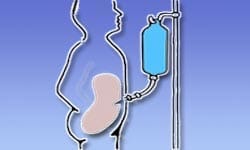Hypercalcemia of Malignancy
Consideration should be given to the severity of as well as the symptoms of hypercalcemia. Vigorous saline hydration alone may be sufficient for treating mild, asymptomatic hypercalcemia. Overhydration should be avoided in patients who have potential for cardiac failure. In hypercalcemia associated with hematologic malignancies, the use of glucocorticoid therapy may be helpful.
Moderate Hypercalcemia
The recommended dose of Aredia in moderate hypercalcemia (corrected serum calcium* of approximately 12-13.5 mg/dL) is 60 to 90 mg given as a SINGLE-DOSE, intravenous infusion over 2 to 24 hours. Longer infusions (i.e., >2 hours) may reduce the risk for renal toxicity, particularly in patients with preexisting renal insufficiency.
Severe Hypercalcemia
The recommended dose of Aredia in severe hypercalcemia (corrected serum calcium*>13.5 mg/dL) is 90 mg given as a SINGLE-DOSE, intravenous infusion over 2 to 24 hours. Longer infusions (i.e., >2 hours) may reduce the risk for renal toxicity, particularly in patients with preexisting renal insufficiency.
_______________________
*Albumin-corrected serum calcium (CCa,mg/dL) = serum calcium, mg/dL + 0.8 (4.0-serum albumin, g/dL). |
 |
Renal Insufficiency
Aredia is excreted intact primarily via the kidney, and the risk of renal adverse reactions may be greater in patients with impaired renal function. Patients who receive Aredia should have serum creatinine assessed prior to each treatment. In patients receiving Aredia for bone metastases, who show evidence of deterioration in renal function, Aredia treatment should be withheld until renal function returns to baseline.
In clinical trials, patients with renal impairment (serum creatinine >3.0 mg/dL) have not been studied. Limited pharmacokinetic data exist in patients with creatinine clearance <30 ml/min. For the treatment of bone metastases, the use of Aredia in patients with severe renal impairment is not recommended. In other indications, clinical judgment should determine whether the potential benefit outweighs the potential risk in such patients. |
|


